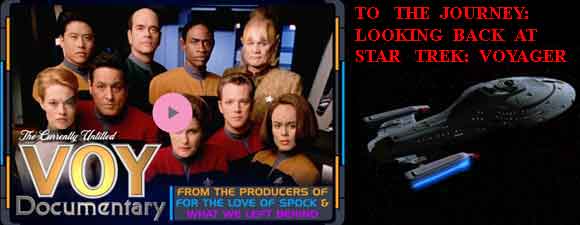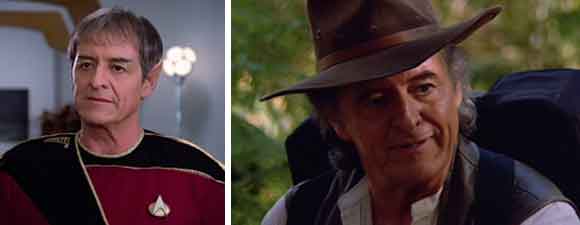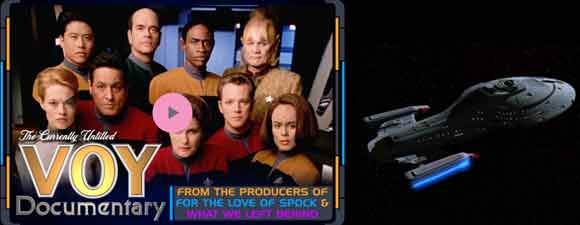Retro Review: Dreadnought
6 min read
dreadnoughtbanner
Voyager encounters a Cardassian missile that Torres reprogrammed for the Maquis use.
Plot Summary: When Voyager discovers that a weapon with mass destructive power has destroyed a probe, Torres recognizes the weapon as Dreadnought, a Cardassian missile that she was able to intercept and reprogram to destroy a Cardassian fuel depot. She had hoped to help the Maquis, though Chakotay had objected to her taking such an action without his approval. Apparently pulled into the Delta Quadrant by the Caretaker, the adaptive missile is now targeting a peaceful planet it has mistaken for the Cardassian base. When Torres beams aboard, Dreadnought recognizes her voice commands, but when she returns to Voyager, the missile’s computer – which uses Torres’s own voice – informs her that she has evidently been coerced by the Cardassians because the odds of being in the Delta Quadrant are negligible. The missile resumes course for the planet, so Janeway alerts the planetary leaders, who send their own fleet to try to defend themselves, Torres beams back to Dreadnought and attempts to access the original Cardassian programming. Dreadnought detects these actions, severs communication with Voyager, and terminates life support to kill Torres. Unable to stop Dreadnought with weapons, Janeway prepares to use a warp core breach to destroy both the missile and Voyager, which will save the planet. She orders the crew into life pods and shuttles, but before Voyager’s self-destruct sequence completes, Torres disables Dreadnought by bringing down the missile’s containment field. Tuvok beams her out just before Dreadnought explodes at a safe distance from the planet. The crew returns to Voyager as Torres is treated by the Doctor, who is miffed not only that Janeway forgot about him when she decided to destroy the ship, but that Kes has suggested that Wildman name her unborn child after Kes’s father although Kes never suggested that the Doctor take her father’s name.
Analysis: I’ve spent a decade telling myself that I couldn’t have loved Voyager‘s early seasons as much as I thought I did. “Dreadnought” is one of several episodes reminding me that I’m a liar. I love everything about it. The plot is a bit predictable – it has elements in common with a whole bunch of sentient weapon dramas from “The Changeling” on up – but it’s a terrific character drama that incorporates many of Voyager’s ongoing arcs, including the Doctor’s search for a name and his friendship with Kes, Wildman’s pregnancy, the civilian consequences of Maquis violence, the Kazon conspiracy with Jonas, Torres and Paris attempting to come to terms with their rebellious sides, Tuvok’s devotion to the captain, and Chakotay loving Janeway so much that he forgets not to blurt out things like “I’m not leaving you on the ship!” in front of the bridge crew when she orders him to begin an evacuation. Do NOT argue with me about that last one – I went into this rewatch not even wanting to see it, and it’s still so obvious it’s painful – I don’t care how much Chakotay/Seven they tried to shove on us at the end of the series, his focus as a person far more than a first officer is always on Janeway. But more on that later, because “Dreadnought” is a shining example of everything Voyager does right with Torres, one of the greatest female characters ever in sci-fi TV. Things haven’t greatly improved in the real world for female engineers since the series first aired, they’re still greatly outnumbered and subjected to forms of belittling and harassment which have thankfully become more rare in medicine and scientific research, so it’s still a thing of beauty to see Torres at the top of her game, so smart that she has to work against her own genius to disable a weapon she created. The writers don’t try to overdo her feminine side, so I find her more genuine than Firefly‘s “Look how much she’s a girl!” Kaylee, and Torres has plenty of insecurities and flaws, yet they don’t get in the way of her brilliance.
Take the scene where the missile informs Torres that she programmed it to lie, which she denies at first. Then Dreadnought demonstrates, in the presence of the two mentors whom Torres has most wanted to impress, the evidence of her paranoid scheming as she created the weapon, when one of the contingencies for which she planned was the possibility that she could be compromised or go soft. The self-abnegating oedipal crush on Chakotay revealed in “Persistence of Vision” makes so much more sense here, listening to her explain to Paris that she thought Chakotay would be proud of her ruthlessness rather than horrified by it. If Torres wants to learn to control her impulsive, violent Klingon temper, it’s no wonder she gravitates toward Chakotay, who emphasizes the peaceful beliefs of his ancestors and prioritizes non-violence more than Tuvok. Chakotay covers for her in that he doesn’t tell Janeway how upset he was when Torres created Dreadnought, but he doesn’t go out of his way to absolve Torres of responsibility for the disaster they face, even though the Caretaker is as responsible for bringing Dreadnought to the Delta Quadrant as for bringing Voyager. There’s another lovely moment when Torres and Paris switch roles after he’s been comforting her for thinking too much like a Maquis and creating the deadly weapon; he expresses surprise at how well she’s put that past behind her to fit in as a Starfleet officer, at which point she wants to know why Tom himself is having such a hard time, picking fights and slacking on Starfleet’s bureaucratic details. They have a lovely balance, as do Torres and Kim when the latter points out to her that Dreadnought isn’t wasting energy worrying about what it could have done differently. One of the things I resent when Seven of Nine appears is the way she disrupts the camaraderie among these three officers, all of whom have weaknesses that they face best when working together. Having Torres and Paris marry isn’t the same thing as showing their bond.
Roxann Dawson is always enjoyable to watch but it’s particularly effective listening to the differences between the many voices she gives Torres versus the cloying, falsely friendly voice she gives Dreadnought. Because the weapon of mass destruction speaks in B’Elanna’s own cadences, it’s made explicit that Torres’s biggest conflict has always been with her own anger and doubts, so it’s particularly satisfying to see her resolve the entire situation by herself, sequestered from the sacrifice everyone else is ordered to make. Janeway decides on the self-destruct option awfully quickly, without much consultation or discussion of whether the missile could be destroyed by blowing up shuttles or jettisoning the warp core; no wonder Jonas is secretly signaling the Kazon to find out whether Seska can save him, and it’s awfully soon for this gimmick considering that the captain was just telling Hogan how eagerly she’d blast apart her ship and crew to keep them out of Kazon hands. But I do love Janeway for her conviction that this Starfleet crew must save an innocent planet, and I adore the dignity with which she tells Chakotay that they don’t have time to debate his objections to her going down with the ship. She convinces him to let go of her arm with a single charged glance that simultaneously acknowledges his feelings and reminds him that they’re secondary to duty. It’s the most emotionally gripping moment in an episode that’s packed with them, yet it ends with captain and first officer as a portrait of protocol, neither letting personal feelings get in the way of duty. This relationship could have been better than Mulder/Scully, Roslin/Adama, and Booth/Brennan all together if only the writers had had the courage to take the same leap taken on those other shows and let it develop as it should have.







I know you ship Janeway/Chakotay, Michelle — you’ve made that VERY clear 🙂 — but I think the creators of Voyager were right in not letting it go any farther than the occasional heated glance. At the time this show was made, having a woman in charge was still a big deal, and putting her in a romantic relationship with a guy on the ship had the potential to reduce her to “just a girl” status. Yeah, it’s dumb that having romantic feelings should condemn a woman, when they don’t condemn a man, but the status of women in our society in 1995 (and even today) is such that women have SO much more to prove. nnPersonally, I ship Janeway/Tuvok. When a Vulcan will compromise his moral principles for you, it means he loves you. 😉
Torres one of the greatest female characters in sci-fi TV ever? Hmm.
It’s not a bad episode but it wasn’t great either. I guess I compare everything Star Trek to DS9 and the bar is set very high.